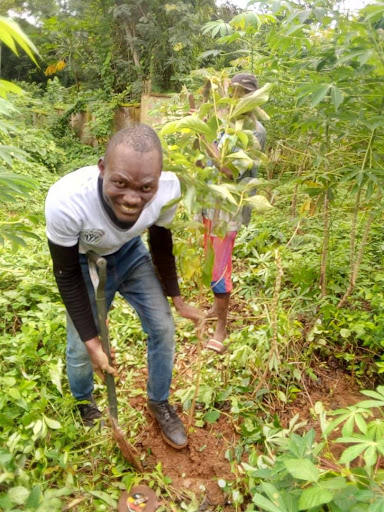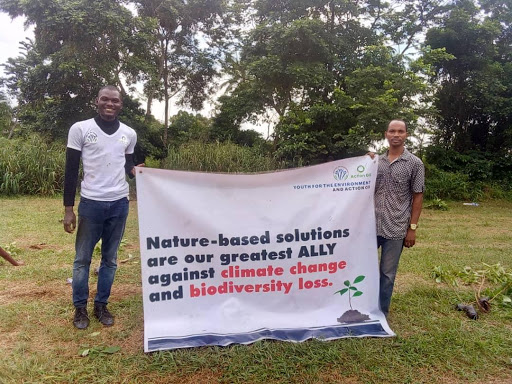Name: Elujulo Opeyemi
Age: 28
Country: Nigeria
MY CLIMATE ACTION IN NIGERIA – MOTIVATION, CHALLENGES, AND HOPE!
My name is Elujulo Opeyemi, a 28 years old climate and conservation actor in Nigeria, and the National Director of Youth for the Environment.
I grew up to understand the relationship between human and nature, how trees as they grow absorb the carbon dioxide emissions in our environment, and at the same time provide many essential services to human survival, while man’ strategic position in the evolutionary ladder automatically registered him as land manager, one that should protect and conserve nature. A relationship structured to be beneficial to both parties, rather than the existing parasitic one in favour of man, that continues to destroy the bio-physical features of forest and forest resources; our ally against climate change. Unfortunately, this one sided relationship like in many other nations of the world is also observable in Nigeria as we make attempts to meet the demands of the most populous nation in Africa.
Knowing that it took the world until the year 1830 to record its first billion people always gladdens my heart, as I imagine how green and beautiful the environment would have looked in those years. However, a population figure of seven billion as of today, coupled with eco-degrading practices and unsustainable exploitation of natural resources has shown how damaging it could be for nature. The encroaching of man into wildlife habitat in Nigeria has resulted in more species becoming extinct in recent times, and loss of over 90% of the nation’s forest estate.
If trees utilizes the carbon dioxide in the global environment which is a major driver of global heating, and in turn, provides oxygen for us, then I supposed it was just safe to assume that man would cut less trees, replace where and when cutting is inevitable, and restore forest areas where degraded, after all it only translates to more benefits for human and nature, but then, this has not been the case observable in the Nigeria environment. People would rather cut and not replace, especially in cases where it is logged illegally, which appears to be often than occasional, even as the scale of the race against climate crisis continues to appear weightier in favour of climate change.
This unwelcomed reality in my community forced my empathy for nature, as its survival gets challenged daily by the same people who are supposed to care for and protect it. I could not bring myself to imagine how future generations would have to compete for so many things that our parents enjoyed when we first borrowed them this environment, or how wildlife might be forced into extinction should the current rate of deforestation continue. The reality of climate change daily stir right into my eyes to tell me how much we are losing the race, as the local farmers in my community lamented of poor yield as the irregularities in rainfall pattern intensifies, coastal dwellers getting ransacked of their lives and livelihood as the increased ocean took everything for nothing, the early morning sun that once refreshed my skin had just become one that burns it. At this point I realized protecting our environment for me had to become a responsibility. I knew I had to contribute my quota to change the narrative. I knew I had to play my part in making our world a sustainable one. So I began to ask some questions that eventually shaped the activities of Youth for the Environment. Questions like; ‘why do people only cut trees and not plant another ones to replace it? If global statistics implicates agriculture as one of the foremost emitters of greenhouse gases and driver of deforestation, thus driving climate change, how can we adapt agriculture to climate change?. In return, my findings to these questions gave the push I needed to translate my empathy into empathizing.
Rural farmers who basically feed Nigerians had little or no knowledge of climate change even though they suffer most from its backdrops. So I decided to promote the agroecological farming approach that mimics the natural diversity of the forest ecosystem among farmers. I also started working with youths and children to restore degraded forest lands by replanting trees that are indigenous to such area, and to ensure the sustainability of our cause, Youth for the Environment began to establish green enthusiast clubs in secondary schools in South-West Nigeria to promote knowledge sharing, cultivate the culture of tree planting in children, and also, promote the inclusion of youth and children in discussions relating to the achievement of the goal of sustainable development.
With our project in communities in South-West Nigeria, Youth for the Environment is repositioning agriculture to be a nature-based solution to climate change and nature conservation that we can trust using the agroecological approach, by encouraging local farmers to not cut down all the trees on proposed farmlands in their attempts to expand/increase production, and promoting the use of organic rather than inorganic fertilizer. Also, to maximize the value of trees as our ally against climate change, as well as its co-benefit as home to wildlife among others, we also work to restore degraded forest lands via our reforestation projects, even as we advocate for forest conservation in forest dependent communities in South-West Nigeria. Furthermore, we realized from our projects that more than 75% of children participants in our tree-planting projects often say they would like to plant again, so we decided to work with children to ensure that our conservation and reforestation effort is promoted and projected to a wider audience as the children encourage and motivate their parents not to cut down trees in their backyards and farms, and also, motivate them to plant back where and when cutting is a must.
However, instrumental to the success of every forest restoration project is the availability of seeds/seedlings which are the bedrock of any tree planting project, and this is one of the major factors that limit our reach and actions for climate and nature. With enough and available resources at our disposal, my team and I are ever ready to plant until all degraded lands are restored, after all, it only translates to a reduction in the warming of the Nigeria environment, with a co-benefit of more ecosystem services that are essential to our survival, but then, accessibility to seedling has always been a limiting factor, one that is traceable to the availability of a few operational nurseries in Nigeria, majority of which are situated in the states ministry of environment, far away from communities and areas where tree planting intervention is mostly needed. Furthermore, the gap between farmers group, non-governmental organizations, and ministries is too wide, and as a result farmers and local NGOs are not able to access resources that would promote reforestation and afforestation projects in Nigeria. To promote commitment of youths to this nature-based solution in Nigeria, our government at the federal and local level should help include climate actions in the national development plans, featuring the establishment of seed banks and nurseries at the community level so as to increase our accessibility to seeds/seedlings for tree planting related projects. Additionally, another major challenge is the challenge of getting farmers attention to hear you tell them to not cut down trees, and when you do have their attention, then starts the challenge of ‘why should I not cut trees on my farm when cutting it gives me more place to plant’. Visiting farmers group with incentives like organic fertilizers and seeds has over time helped us with the challenge of getting their attention, but not the challenge of cutting down timber trees. However, we believe that incentivizing farmers for every tree they keep on their farms just might help with promoting agroforestry. Unfortunately Youth for the Environment don’t have the resources to make this happen, yet.
However, despite these challenges, we keep forging ahead taking actions where we can, and as much as the resources at our disposal could take us. This year, our action plans is aimed at restoring degraded lands in local communities, and forest reserves in South-West Nigeria, featuring the planting of 3000 trees and also raise 5,000 conservation and climate actors, and work with existing youth-led local community organizations to improve forest management, to respond to the dire state of both people’s health, and our planet. The project is structured to provide ‘multiple wins’, with direct and indirect livelihood benefits to rural communities and smallholders in a way that allows for nature conservation and climate change mitigation and adaptation.
Youth for the Environment works and hope to one day see the Nigeria environment and the world at large become resilient and on a sustainable path, with more youth involvement in conservation and environmental protection, and to ensure that the generations to come enjoy at least the same benefits and beauty that our environment offers, even as human and nature live in harmony.



